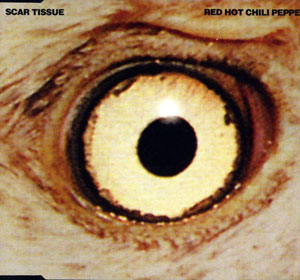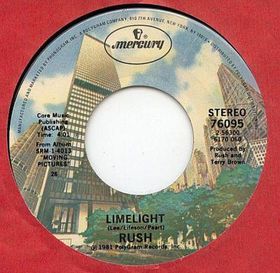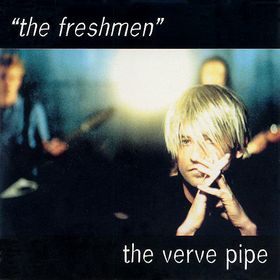
April Wine is a Canadian rock band formed in 1969 and based in Halifax, Nova Scotia. Led by singer-guitarist-songwriter Myles Goodwyn from its inception in 1969 until his death in 2023, April Wine first experienced success with their second album, On Record (1972), which reached the top 40 in Canada and yielded two hit singles: a cover of Elton John's "Bad Side of the Moon", a top 20 hit in Canada; and a cover of Hot Chocolate's "You Could Have Been a Lady", a number 2 song in Canada.

"Scar Tissue" is the first single from American rock band Red Hot Chili Peppers' seventh studio album, Californication (1999). Released on May 25, 1999, the song spent a then-record 16 consecutive weeks atop the US Billboard Hot Modern Rock Tracks chart as well as 10 weeks atop the Billboard Mainstream Rock Tracks chart, and it reached number nine on the Billboard Hot 100. It was also successful in Iceland, New Zealand, and Canada, reaching numbers one, three, and four, respectively. In the United Kingdom, it charted at number 15 on the UK Singles Chart.

"Arthur's Theme (Best That You Can Do)" is a song performed and co-written by American singer-songwriter Christopher Cross as the main theme for the 1981 film Arthur, starring Dudley Moore and Liza Minnelli. It was recognized as the year's Best Original Song at both the 54th Academy Awards and 39th Golden Globe Awards.

"Smooth" is a song performed by American rock band Santana and Rob Thomas of Matchbox Twenty, who sings the lead vocals. It was released on June 15, 1999, as the lead single from Santana's 1999 studio album, Supernatural. It was written by Itaal Shur and Thomas, who re-wrote Shur's original melody and lyrics, and produced by Matt Serletic.

"Limelight" is a song by Canadian progressive rock band Rush. It first appeared on the 1981 album Moving Pictures. The song's lyrics were written by Neil Peart with music written by Geddy Lee and Alex Lifeson. "Limelight" expresses Peart's discomfort with Rush's success and the resulting attention from the public. The song paraphrases the opening lines of the "All the world's a stage" speech from William Shakespeare's play As You Like It. The band had previously used the phrase for its 1976 live album. The lyrics also refer to "the camera eye", the title of the song that follows on the Moving Pictures album.

"Crazy on You" is a song by American rock band Heart from their debut studio album, Dreamboat Annie (1975). It was released in March 1976 as the album's third single in Canada and the album's debut single in the United States. It reached the top 25 in Canada and the top 35 in the US. It found more success in the Netherlands and Belgium where it peaked at number 2 and 13, respectively, in early 1977 after its release as the second single from Dreamboat Annie in those countries. It is considered one of Heart's signature songs as it is one of the most played tracks on classic rock radio stations in the US.

"School's Out" is a song first recorded as the title track of Alice Cooper's fifth album. It was released as the album's only single on April 26, 1972. "School's Out" was Alice Cooper's biggest international hit and it has been regarded as their signature song and reached number seven on the Billboard Hot 100, number three in the Canadian RPM 100 Singles chart, number two on the Irish Singles Chart and number one on the UK Singles Chart.

"'It's a Heartache'" is a song recorded by Welsh singer Bonnie Tyler. Written by Ronnie Scott and Steve Wolfe, and co-produced with David Mackay, the single was released in November 1977 by RCA Records. The song topped the charts in Australia, Canada, and numerous European countries, and reached No. 3 in the US and No. 4 in the UK. Worldwide, "It's a Heartache" sold around six million copies.

"The Freshmen" is a song by American alternative rock band the Verve Pipe. Released in January 1997 as the third single from their second studio album Villains, the song became the band's breakthrough hit and is the group's highest-charting single, peaking at number five on the US Billboard Hot 100, number six in Canada, and number 28 in Australia.

Heartbreaker is the twentieth solo studio album by American singer-songwriter Dolly Parton. It was released on July 17, 1978, by RCA Victor. The album was produced by Gary Klein and Parton with Charles Koppelman serving as executive producer, and was an even more direct aim at the pop charts, with several of its songs verging on disco. The album topped the Billboard Top Country Albums chart for nine consecutive weeks and peaked at number 27 on the Billboard 200. The album produced two number one hits on the Billboard Hot Country Songs chart, "Heartbreaker" and "I Really Got the Feeling", while "Baby I'm Burnin'" peaked at number 25 on the Billboard Hot 100. The album has been certified Gold in the United States and Canada.

The Nature of the Beast is the ninth studio album by Canadian rock band April Wine, released in 1981. The album was recorded at Le Manoir Studios, in the village of Shipton-on-Cherwell, in Oxfordshire, England following the band's 1980 European tour. This album was April Wine's commercial peak, certified Platinum in the US and reaching #24 on the Billboard 200 album chart.

"Downtown Train" is a song by Tom Waits released on his album Rain Dogs in 1985. The promo video for the song was directed by Jean-Baptiste Mondino and features boxer Jake LaMotta.

David Ball is an American country music singer-songwriter and musician. Active since 1988, he has recorded a total of seven studio albums on several labels, including his platinum certified debut Thinkin' Problem. Fourteen of Ball's singles have entered the Billboard Hot Country Songs charts. His highest-peaking chart entries are 1994's "Thinkin' Problem" and 2001's "Riding With Private Malone", both of which peaked at No. 2.

"Shame" is a 1977 single recorded by American singer Evelyn "Champagne" King, written by John H. Fitch Jr. and Reuben Cross, and released by RCA Records. It was released by RCA Records as part of King's debut album, Smooth Talk. The extended remix was produced for the twelve-inch vinyl single and would later replace the album version of the song in late-1970s reprints of the album. "Shame" was successful on Billboard music charts and would become one of King's signature songs, though it varied on international music charts. The song was covered by Zhané for the 1994 film A Low Down Dirty Shame and Kim Wilde in 1996.

"Swallowed" is a song by British rock band Bush, released on 15 October 1996 as the lead single from the band's 1996 album, Razorblade Suitcase. It also appeared on both Bush greatest hits albums, with live versions appearing on Zen X Four (2005) and Live in Tampa (2020), with remixed editions featured on Deconstructed (1997) and Loads of Remixes (2024). The release of "Swallowed" followed the fifth and final single off of the band's 1994 debut album Sixteen Stone, "Machinehead", by only six months.

"Everything You Want" is a song by American alternative rock band Vertical Horizon, the title track and second single from their third studio album. First released to alternative radio in October 1999, the single reached the top of the US Billboard Hot 100 on July 15, 2000, following a commercial release on June 27, 2000. It also peaked atop the Billboard Adult Top 40 and was Billboard's "Most Played Single" of 2000. It remains the band's most successful single.
"Peter Gunn" is the theme music composed by Henry Mancini for the television show of the same name. The song was the opening track on the original soundtrack album, The Music from Peter Gunn, released by RCA Victor in 1959. Mancini won an Emmy Award and two Grammys for Album of the Year and Best Arrangement. In 2005, the song was inducted into the Grammy Hall of Fame.

"Walls (Circus)" is a song written by American singer-songwriter Tom Petty and recorded by Tom Petty and the Heartbreakers. It was released in July 1996 as the first single from their soundtrack album Songs and Music from "She's the One". The song features Lindsey Buckingham on background vocals and was recorded at Sound City Studios by engineer Sylvia Massy. The song peaked at number 69 on the U.S. Billboard Hot 100 chart. An alternate arrangement of the song, played at a faster tempo, was included on the soundtrack under the title "Walls (No. 3)". The song was later covered by Glen Campbell on his 2008 album Meet Glen Campbell and by the Lumineers on the first anniversary of Petty's death.

"Roller" is a song by Canadian rock band April Wine, released off their 1978 studio album First Glance. The song peaked at #25 on the RPM 100 Singles chart in Canada, and #34 on the Billboard Hot 100 on April 28, 1979, in the United States, becoming their first American hit since 1972.

"Enough Is Enough" is a hard rock song by the Canadian rock band April Wine. It was written by Myles Goodwyn and appeared on the band's tenth studio album, Power Play (1982). The song was the first single released from the album and was a big hit in Canada and the United States.



















